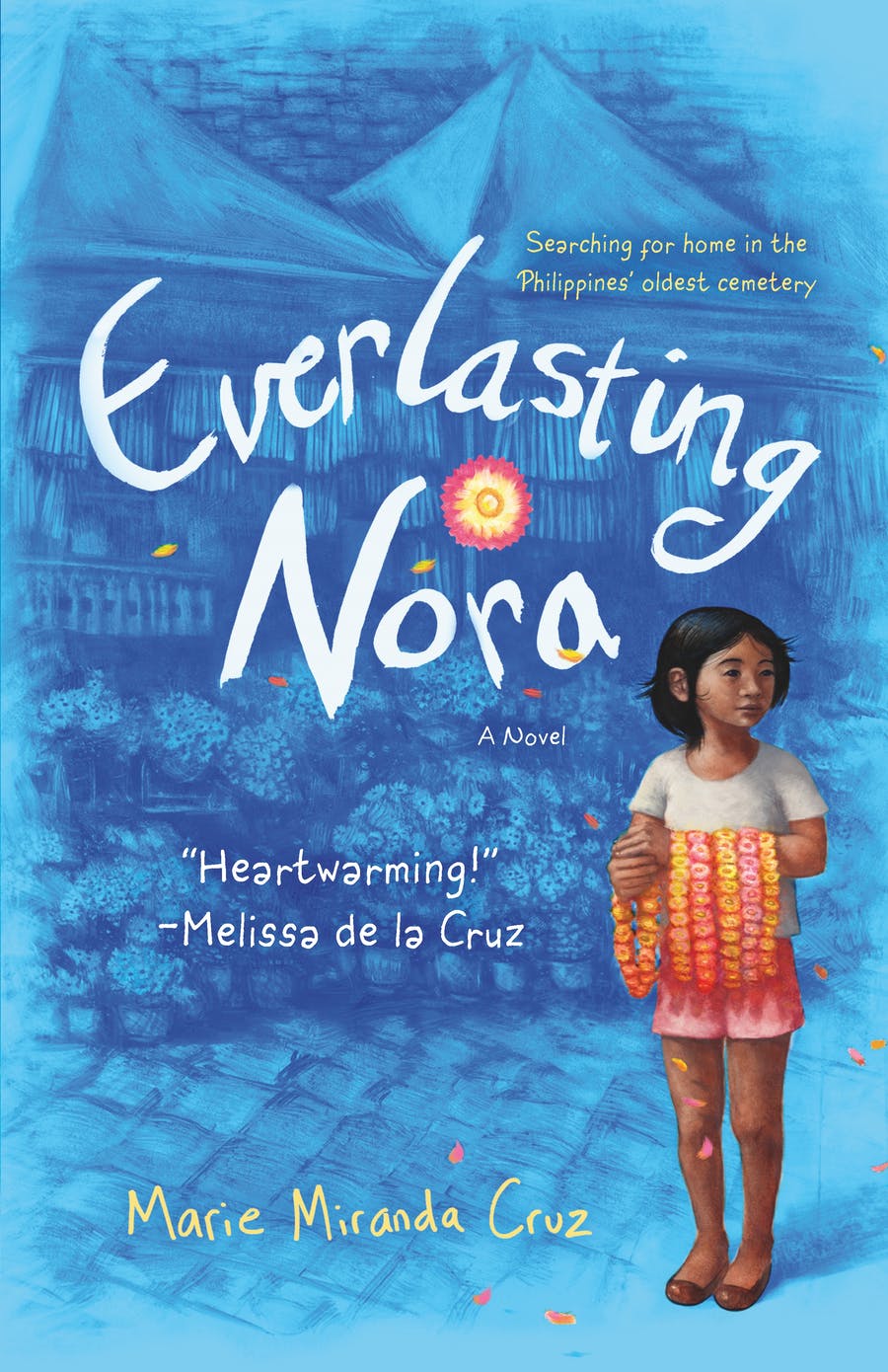
Everlasting Nora
Written by Marie Miranda Cruz
Starscape, 2018, 287 pp
ISBN: 978-0-7653-9459-0
Nora and her mother take up residence in a mausoleum in Manila’s North Cemetery in the Philippines after they lose Nora’s father in a devastating fire. They live day to day with money they earn from Nora’s flower garlands and doing laundry service. 12-year-old Nora longs to go back to school and live in a real home. She meets Jojo, who was born in the cemetery and lives with his Lola. Nora resists becoming friends with Jojo but she is forced to rely on him when her life is turned upside down when her mother goes missing. Told in first person from Nora’s present-day perspective, the story describes Nora following clues that uncover her mother’s gambling and loans from unsavory people. Nora is left to rely on help from the people who live with her in the cemetery and on friends like Jojo whom she had feared. She stands up to violent thugs and faces her fears in her pursuit to bring her mother home. Nora learns that home may come in the most unlikely of places and that family is not always the people to whom you are related by blood.
The setting of Everlasting Nora in the North Cemetery in Manila parallels real life for many poverty-stricken people in Manila. Many families have lived in the cemetery for generations. Bayanihan, the Filipino essence of community and the spirit of unity and cooperation which is at the heart of Filipino culture, is something that Cruz wanted to ensure was represented in the story. When Nora tangles with the thug that her mother was last seen with, she finds that her neighbors at the cemetery are there to help her.
Cruz’s research for the story is reflected in the authentic descriptions of “squatter life” that comes across through details of the tombs and mausoleums people live in and their odd jobs and work to make a day’s wage and provide food. Cruz lived in the Philippines as a child, and while she feels that her memories from that time are fairly accurate, she “had to concede to the fact that many things have changed in the Philippines during that time” and so she used other means to make sure that the story maintained authentic representations of the culture, people, and customs of the country (Cruz, personal communication). She spent many hours researching the life of people who live in the cemetery and relied on “sensitivity readers,” one of whom resided in the Philippines.
Cruz sees her book as both a window and a mirror for her audience. She wanted “to tell a story from a perspective that is rarely seen in children’s literature and from a setting many people, kids and adults, have never seen” but she also wanted to make sure that “Filipinos all over the world would be able to see themselves in a story, to show them that Filipino stories are important.” She accomplishes this with witty storytelling on the subject of people living in poverty in the cemeteries while maintaining the authenticity of important cultural customs. She interweaves Tagalog throughout the book in an easy flowing manner that feels natural to the story.
One text that would pair well with Everlasting Nora is The Bridge Home by Padma Venkatraman (2019) which is set in India. While representing different cultures, both books provide authentic representations of children living in poverty and express the resilience of children and their will for survival. Another text that would pair well is The Island at the End of Everything by Kiran Millwood Hargrave (2017) which describes the Filipino culture in an authentic way for the times represented. Through journeys in search of their mothers, the strength and determination of the characters is evident, along with their growth in their ideas of home and sense of belonging in a place least expected.
Marie Miranda Cruz was born in the Philippines and grew up there and in the United States while her father was in the United States Navy. She lives in Los Angeles with her family. For more information, visit her website.
Jessica Horton, University of Arizona
© 2021 Jessica Horton

WOW Review, Volume XIII, Issue 4 by Worlds of Words is licensed under a Creative Commons Attribution-NonCommercial-ShareAlike 4.0 International License. Based on work by Jessica Horton at https://wowlit.org/on-line-publications/review/xiii-4/5/
